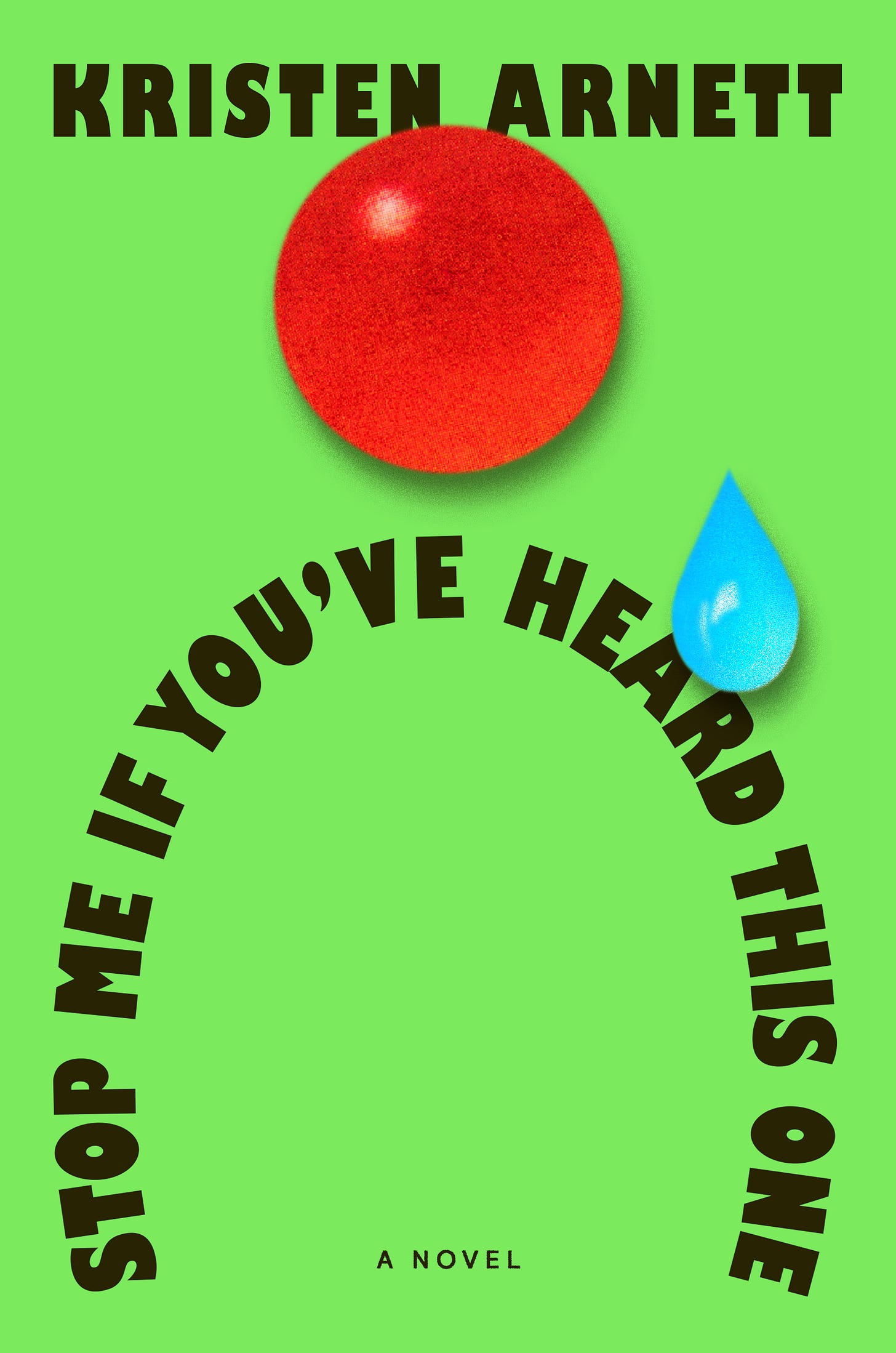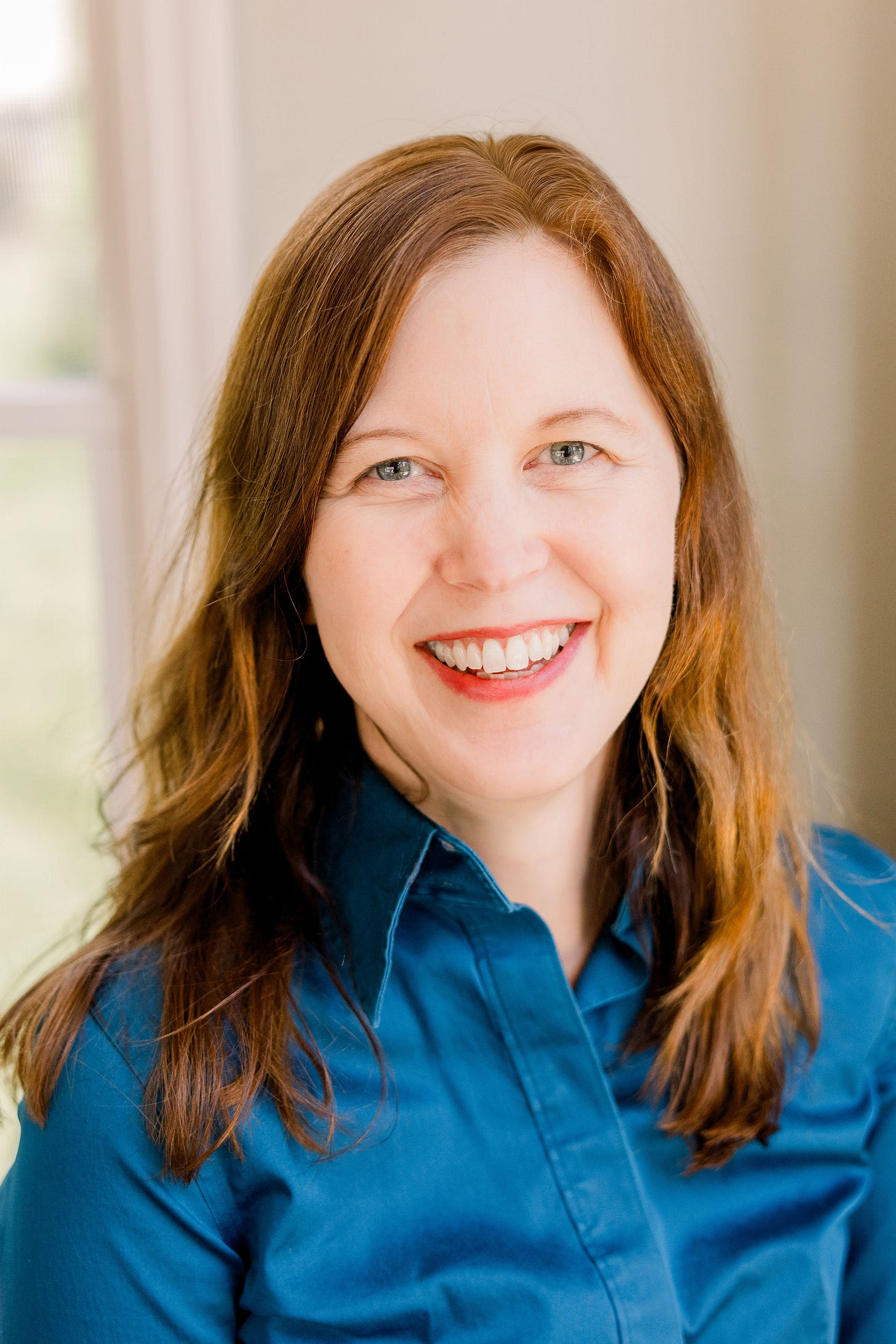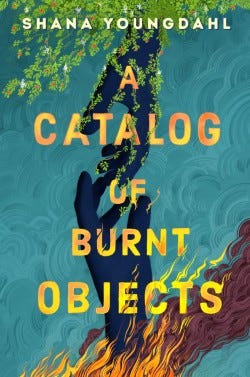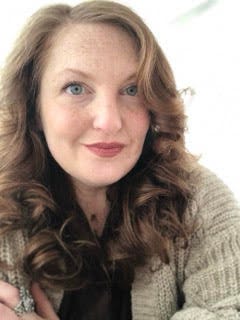✨Kristen Arnett Built a Full-Scale Clown Car in Her Head Before Writing Her Latest— Do You Need One Too?✨
Plus, Shana Youngdahl on the practical application of poetry in fiction writing; Bianca's latest fundraiser giveaway; and CeCe's course is just one week away!
Happy Friday, writing friends!
Publishing isn’t a competition, but it is a competitive industry, which makes it really hard not to fall into the trap of comparing your writing journey to someone else’s (no matter how many times we tell you not to do it, or how many times you try to tell yourself the same thing). It’s just too easy to feel like you’re in a race to a finish line you can’t see but are sure everyone else is going to reach before you do—if you ever do. And one of comparison’s most common tripping hazards comes from watching another writer seemingly hare-ing their way through the drafting of their manuscript while you’re plodding along like the proverbial tortoise.
Anyone out there who would like to take things a little more slowly, but keeps falling into the comparison trap, will enjoy this week’s podcast episode with Kristen Arnett (whose name you likely recognize from her breakout bestseller, Mostly Dead Things). In a conversation with Bianca that ranges wide and drills down deep, Kristen shares a lot of interesting insights into her process, including the fact that before so much as putting finger to keyboard for her latest (Stop Me If You've Heard This One, about a woman who’s a professional clown), she focussed on creating “a full-scale clown car inside [her] head,” spending an entire year researching clowns and thinking about her character until finally (her mental clown car at capacity) she knew the exact kind of person she was and “her voice was immediately there.” (Editor’s note: I don’t know about you all, but my ideal writing pace is less Indy 500 and more granny-in-a-shellsuit-and-nurse-sneakers-powerwalking-in-the-mall. But, somehow, even knowing what works best for me, I still look at all the racing writers out there and feel not merely tortoise-like, but like a tortoise on crutches. So on behalf of mallwalking tortoises everywhere, I would like to sincerely thank Kristen for her perspective!). 🤡🚗🤩
Of course, there is always another way of looking at it, which is exactly what Shana Youngdahl does in this week’s Q&A when she talks about the importance of getting the words out because (and we know you’ve heard this one before, too, but it bears repeating) you can’t edit a blank page. These aren’t truly opposing viewpoints, though—better to look at one as permission to do what works for YOU, and the other as a reminder to not prolong preparation and research to the point where they become procrastivity, an excuse to avoid writing at all, even slowly. Shana also shares her thoughts on the practical aspects of poetry—on the surface an oxymoron if ever there was one, but in reality, the skills one learns from writing poetry can help with line level writing and editing like nothing else. ❤️📝
And if getting some editing assistance is something you think you’d benefit from, you’re going to really like Bianca’s announcement this week: She’s just launched a fundraiser that includes a whole host of incredible literary prizes, like developmental edits, coaching packages, manuscript critiques…and more! It’s a great cause, and entries are a great price (practically free in comparison to the value of the prizes on offer!)—keep reading for more details!
Last but absolutely not least, it’s now just one week until CeCe’s Starting it Right course begins. Haven’t signed up yet? Everything you need to know can be found below!
That’s all for now. Thanks for reading! ❤️
The Shit No One Tells You About Writing Team
P.S. Still not sure about upgrading to paid? Check out our Tuesday Teaser below to see what you’re missing!
This Week’s Podcast✨🎙️✨
This week on the podcast (listen to it here or watch it on YouTube!), Bianca interviews New York Times best-selling writer, Lambda Literary Award finalist and Shearling Fellowship recipient, Kristen Arnett. They discuss the unique aspects of Kristen's writing process, including her extensive research, character development, and the importance of humor and surprise in storytelling. Arnett shares insights into her creative journey, the intentional structure of her chapters, and the significance of character insights in connecting with readers. The episode also features a reading from Kristen's latest book, Stop Me If You've Heard This One, showcasing her distinctive voice and style.
“When I began this book, I sat and thought about it for a whole year before I ever put pen to paper. I was like, ‘I want to be so ready to sit down with this particular person and be so very much in their head that I can't fuck this up.’”
-Kristen Arnett
More information about Kristen Arnett can be found on her website. She’s also on Instagram!
You can pre-order Stop Me If You’ve Heard This One on our Bookshop.org affiliate page here. Buying books through this link supports a local indie bookstore, as well as The Shit No One Tells You About Writing 📚❤️
Q&A with Shana Youngdahl
Shana Youngdahl is a poet, professor, and fiction writer. An award-winning educator, Shana loves helping people of all ages embrace the stories they need to tell and is lucky enough to do this for her work as Associate Professor of Writing in the MFA program at Lindenwood University. The author of two full-length poetry collections and several chapbooks, her debut novel for teens As Many Nows As I Can Get, was a 2020 ALA RISE title, a Kirkus Best Book of 2019, and a New York Public Library top-ten book of 2019 (Dial/Penguin Teen). Her second novel A Catalog of Burnt Objects (Dial/PenguinTeen) was inspired by the destruction of her hometown, Paradise, California in 2018’s Camp Fire. Connect with her online at www.shanayoungdahl.com, Instagram and Substack.
TSNOTYAW: Do you have a go-to mantra or pep talk for the days when writing feels hard?
Shana Youngdahl: It goes something like this: It doesn’t have to be good. It just has to exist. You can throw it out, start over, completely revise. The one thing you can’t do is make something better if it doesn’t exist. Translating the perfect idea in your head to the page and then to a reader is a ton of work. That’s okay. It gets done set by step.
Were you ever close to giving up on writing and, if so, what stopped you?
I’m not sure if this counts but in college I thought maybe I should change my major to Environmental Science because my California Natural History class had me so jazzed that I was leaving class every day writing poems about the root systems of redwoods—I thought this might mean that maybe I should become a scientist instead of a writer. I was seriously delusional, but the pressure to do something with a clearer path to a steady paycheck is real. I realized I didn’t actually want to really be a STEM girl. I just wanted to do enough of the reading that I could write STEM characters.
What would you say you’ve done right to build a strong and supportive writing network?
A supportive network is probably the most important thing a writer can have, and I’ve been building my writing support network since I was in high school. I’ve had to learn to put myself out there in a way that isn’t totally natural to me, and then consciously work to maintain those connections. My current writing group came out of my debut group, and I still haven’t met half the members in real life and it’s been five years!
How do you ensure you have enough time to write amidst so many obligations competing for your time?
We can make time for what we value. So the first step is to intentionally value the work, and then to find the time. I tend to write first thing in the morning so that other work and life obligations are less likely to take over. Sometimes things creep in and I have to do something else for a day or two. Then returning to the routine is key.
Writer’s block: myth or unfortunate reality? If you experience it, how do you overcome it?
Maybe both? The experience of a block comes from something going wrong with the writer’s relationship with writing. This might be questioning the value of the work, or losing the joy in the work. For me, poetry, reading or writing it, can serve to bring me back to my pure love for language, as well as my firm belief that writing can and does make a positive impact in the world.
What question do you wish an interviewer would ask you? (And what’s the answer to that question!)
Ask me: What's the relationship between writing fiction and writing poetry? I studied poetry and taught it for years before I became a novelist. My ability to radically revise came out of years of working with poetry, as did a tendency to think about the relationship between form and function in all types of storytelling. Poetry trains the ear for the sound of language and affords a micro-playground to learn the tools of revision. Revision is my favorite part of the process and that’s come from the language play that poetry invites. Also both my novels are connected to poems—I wrote As Many Nows As I Can Get because of a set of failed poems, and after the Camp Fire my friends Claire and Dave asked me to write a poem to thank their son’s teacher for reopening preschool in her home. Their appreciation of the poem, as well as my experience writing it, led indirectly to A Catalog of Burnt Objects.
You can pre-order A Catalog of Burnt Objects on our Bookshop.org affiliate page here. 📚❤️
Fundraiser for Literacy in South Africa!
Would you like to do some good in the world, and at the same time be entered to win amazing (and we really do mean amazing🤩 ) literary prizes?
Trick question, of course, because who wouldn’t?!
And you’re in luck, because Bianca is hosting a fundraiser for a cause that’s close to her heart—literacy in South Africa—with a whole host of incredible literary prizes up for grabs, including developmental edits, coaching packages, manuscript critiques, Books With Hooks appearances…and so much more!
All you have to do to enter is make a donation to a wonderful cause: The Masana Library Project. By participating in this fundraiser, you’ll be helping supply a South African high school with the kind of basic resources we take for granted in North America, improving their education and making a brighter future for South African learners.
Entries close at 8am ET on April 10th. Until then, keep reading to meet three of our awesome sponsors and learn about their prizes, then head over to Bianca’s website to enter the draw!
Lidija Hilje is an author and Author Accelerator certified book coach based in Croatia. After earning a law degree, she spent a decade practicing in Croatian courts before transitioning to book coaching and writing in English as her second language.
Her debut novel Slanting Towards the Sea is forthcoming from Simon&Schuster in the US, and Daunt Books Publishing in the UK in July 2025. Find out more about Lidija on her website, Instagram, Threads or Bluesky
The prize Lidija has sponsored:
One Month Coaching Package to help a writer outline their literary/upmarket/ women's fiction novel, which includes:
Access to Lidija’s signature program Novel With Meaning (5 video modules with accompanying worksheets)
Written feedback on worksheets
Two coaching calls
Value: $900.
Rebecca Faith Heyman holds a BA/MA in English and American Literature from New York University, and has been editing since 2009. Rebecca offers support to authors pursuing both traditional publishing (Greta Kelly, Emily Belden, Sarah Prager)
and self-publishing (Louise Bay, Elise Kova, Annie Mollova). She is the creator of First Line Frenzy™, a community learning project for writers that has grown into a global phenomenon. Rebecca is known for her ability to bring clarity, humour, and keen discernment to every phase of the writing process. Find out more about Rebecca on her website and Substack.
The Prize Rebecca has sponsored:
50-Page Manuscript Critique in any Fiction Genre, which includes:
Hand-written annotations on a PDF of your pages
Typed chapter-end notes (as needed)
A longer-form editorial memo
A phone or video call to discuss the feedback once you’ve had a chance to review!
Trevor Brooks is currently an MFA Candidate for a Masters in Creative Writing.
Back in 2021, he certified as an Author Accelerator Book Coach and has been working full time as a coach + editor ever since. As a writing coach and developmental editor, he's worked with a range of talented writers, from debut to professionally published, helping like-minded creatives to hone their craft and perfect their stories. He specializes in Literary Thrillers and Mysteries, and has a passion for working with writers who long to tell stories that will endure through many future generations. Find out more about Trevor on his website and Instagram.
The prize Trevor has sponsored:
Developmental analysis and critique, which includes:
Review of the first three chapters (up to 7,500 words) of winner’s manuscript
Findings will be presented via a 3-5 page editorial letter—an in-depth analysis detailing everything related to POV, continuity, pacing, the opening pages as an immediate aggressor for the coming story, character arc + agency, dialogue, sub-plots, maintaining tension, etc.
Line-by-line edits/comments on the client’s pages themselves.
2 brainstorming Zoom calls.
Prior to beginning his review, Trevor will meet with the winning writer for a 1-hour kick-off call to discuss the writer’s WIP, as well as any specifics the writer would like for Trevor to focus on in his evaluation.
Post-eval, you and Trevor will meet for a 60-minute Zoom call to go over the evaluation in its entirety to ensure clarity.
Trevor will then help the winner construct a game plan for how to tackle revisions
Exciting New Learning Opportunity with CeCe!
The beginning—that’s the most important part of your story. It’s the part that must hook the reader. That must make them fall in love with your characters and your world. It’s the beginning that must convince the reader to buy your book, or stay up late and ignore real life in favor of reading your story. The beginning is more high stakes than your climax, because if the reader doesn’t love the beginning they won’t stick around for the rest.
So all you’ve got to do is nail that first chapter? Well that shouldn’t be too hard, right? Wrong. The bad news is that it’s actually very difficult to write a compelling beginning. The good news is that it’s a skill that can be mastered, and literary agent and podcast co-host CeCe Lyra’s got a workshop for that!
This four-day workshop will cover various aspects of how to start your story right, including:
different types of beginnings and how to choose the best one for you;
how to frame your inciting incident in an irresistible way;
elements that go into every effective beginning;
common mistakes made by writers when beginning a story;
how to balance exposition and mystery;
how to make readers fall in love with your protagonist;
how to make readers want to turn to chapter two;
Q&A session;
Surprise bonus session.
Here’s when we’ll meet via Zoom:
March 20 at 7pm Eastern Time (Day One)
March 27 at 7pm Eastern Time (Day Two)
March 30 at 1pm Eastern Time (Cozy Q&A session, cameras on (optional)).
April 3 at 7pm Eastern Time (Bonus Session)
This webinar will also feature an interactive component. Everyone who is registered will have the option of submitting the opening scene of their work by March 20th (submissions received after this date will not be considered). Instructions on how to submit will be sent to you automatically after registration (look for an email from Zoom). Please note that this submission does NOT constitute a query to a literary agent—it is a submission to an educational webinar. You are NOT querying CeCe by submitting to this webinar.
Writers of all categories and genres are invited to attend.
If you cannot attend one or more of the sessions live, please sign up as the recording will be emailed to you 24hr later. Recordings will be available to the viewer for 60 days. Recordings will NOT be sold after the fact.
Note: Cecilia “CeCe” Lyra is a literary agent at P.S. Literary Agency, but her work on this webinar is not affiliated with P.S. Literary Agency, and the views expressed are her own, and do not necessarily reflect the views, opinions, policies, or positions of P.S. Literary Agency.
Tuesday Teaser 😉
In next week’s newsletter exclusively for our paid members, we’ve got an essay by novelist Stuart Nadler, who shares a potentially provocative take on the story arcs we’ve all been taught; Sameer Pandya shares his favourite piece of writing advice (which involves peering into fictional medicine cabinets); and long-time fan of The💩, Elizabeth Shockman (in conversation with the world famous ballerina who’s the subject of her non-fiction debut), shares a video that goes in-depth on the subject of ghostwriting.
Not yet a member? For just $8USD a month or $80USD a year you get:
an exclusive newsletter on Tuesdays featuring bonus author Q&As and other exclusive content from industry experts
access to Carly Watters and CeCe Lyra’s written notes on queries from the podcast’s Books With Hooks feature
monthly bonus podcast episodes, AND
regular Ask Me Anythings / Q&As with Carly, CeCe, and Bianca Marais.
If that doesn’t kickstart your writing journey, we don’t know what will!
That’s all for this week’s news! If you enjoyed it, why not share the love? 🥰
Tune in again next week for more invaluable wisdom from our wonderful hosts! Until then, happy writing! 😍
❤️ The Shit No One Tells You About Writing Team
Our work takes place on land now known as Toronto and Ottawa and we acknowledge that these are the traditional territories of the Mississaugas of the Credit, the Anishnabeg, the Chippewa, the Haudenosaunee, and the Wendat Peoples as well as the unceded, unsurrendered territory of the Anishinaabe Algonquin Nation. Toronto is covered under Treaty 13 and the Williams Treaties. We respect and affirm the inherent and Treaty Rights of all Indigenous Peoples across this land and acknowledge the historical oppression of lands, cultures, languages, and the original Peoples in what we now know as Canada. We invite you to learn more about the land you inhabit, the history of that land, and how to actively be part of a better future going forward together at Native Land or Whose Land.
Carly Watters and CeCe Lyra are literary agents at P.S. Literary Agency, but their work in this newsletter is not affiliated with the agency, and the views expressed by Carly and CeCe in this newsletter are solely that of themselves and do not necessarily reflect the views, opinions, policies, or position of P.S. Literary Agency.












